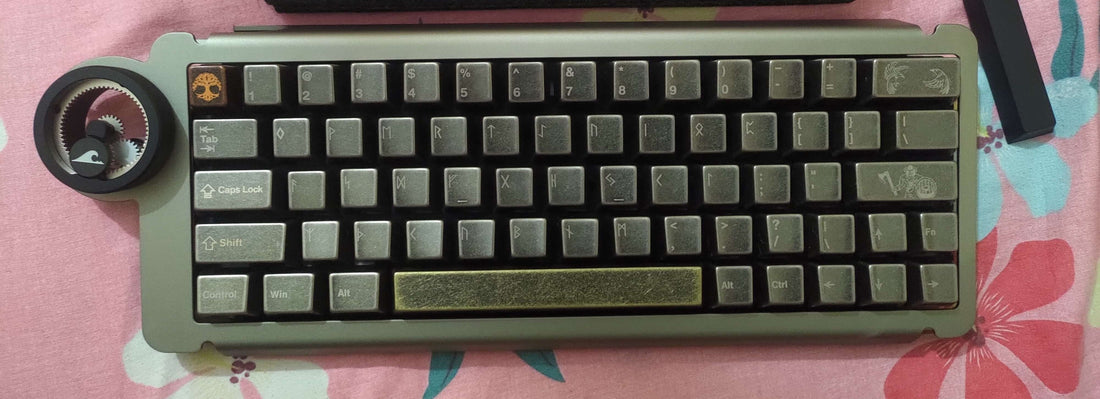One of the most common questions among keyboard enthusiasts and newcomers alike is: “Are keycaps universal?” The short answer: not exactly. Let's dive into what really determines keycap compatibility so you can make an informed decision—and avoid buying the wrong set.
Most important Factors Affecting Keycap Compatibility
Check the keyboard layout
Before purchasing keycaps, determine your keyboard's layout (ANSI, ISO-DE, JIS). Standard layouts (ANSI) are most common, but some keyboards have variations in key size and arrangement. Verifying your layout ensures the keycaps you choose have the correct configuration, particularly for keys like Enter, Shift, and Backspace.

Keycap Size Compatibility

Keycaps are not the same size. Different keyboard layouts come with a variety of keycap sizes, especially for larger keys like the shift, enter keys, or standard spacebar size. For example, the right shift key can be 1.75u on some keyboards and 2.75u on others. Other keys, such as the spacebar, may vary between 6.25u and 7u depending on the layout. So, how to know if keycaps will fit? Always verify keycap sizes and consult a dimensions guide to make sure the keycaps will fit your keyboard.
Spacebar Compatibility

The most common spacebar length of all is around 6.25 units, which is roughly 158mm long measured from the bottom of the spacebar.
Keycap (profile)Height

Most keyboards on the market share the same height ("OEM" profile). This is the standard keycap profile for keyboards. Also, the OEM profile is known for its iconic flat top, a slant to support the user's fingertips, and a slight cylindrical bow.
Switch Type

Not all keycaps fit all switches, and not all switches are compatible with every keycap set. Cherry MX switches are the most common type, and they are compatible with most keycap sets. However, switches like Topre, Kailh, Gateron, and others may have different designs, requiring specific keycaps or adapters to ensure keycaps will fit your keyboard properly. Below is a table summarizing the key characteristics of popular switches:
| Switch Type | Features |
| Cherry MX | Most common, compatible with most keycaps, various tactile and linear options |
| Kailh | Similar to Cherry MX, offers unique Box switches for dust and water resistance |
| Gateron | Known for smoother keystrokes, Cherry MX-compatible, popular with people unlike the “scratchy” |
| Topre | Uses a rubber dome mechanism, not compatible with Cherry MX keycaps without adapters |
| Razer | Designed for gaming, tactile and clicky options, usually only compatible with Razer keycaps |
Keycap Material and Quality

Elevate your keyboard with Awekeys metal keycaps
Keycap material plays a significant role in durability and feel. The most common materials are ABS, PBT, and metal. ABS keycaps are affordable and smooth but tend to become shiny over time. In contrast, PBT keycaps are more durable and resistant to wear, offering a matte texture that doesn’t develop shine as quickly.
Metal keycaps, often made from aluminum or zinc alloys, offer exceptional durability and a premium, weighty feel. They are highly resistant to wear and shine, maintaining their aesthetic over a long period. However, they can be more expensive and may not be suitable for an entire keyboard due to their weight and the potential for a different sound profile compared to plastic keycaps. They're often used for accent keys, like escape keys or WASD sets, to add a touch of luxury and distinct tactile feedback. Our Awekeys metal keycaps, for instance, are renowned for their superior craftsmanship and fit.
Quality also matters when choosing keycaps. Well-made keycaps will fit securely on switches, ensuring stability during typing. Poorly manufactured keycaps, regardless of material, may have fitting issues, causing them to feel loose or wobbly. Always opt for high-quality keycaps to avoid potential compatibility and performance problems.
What You Need to Know Before Buying a Set
Check the switch type of your keyboard
Identifying your keyboard's switch type is important for keycap compatibility. You can find this information in the user manual or by contacting the manufacturer. Most keyboards utilize Cherry MX-style switches with a "+" cross-shaped stem, ensuring compatibility with a wide range of keycaps.
However, if your keyboard uses a different switch type, finding compatible keycaps that match your aesthetic preferences might be more challenging.

Check the keycap profile
The keycap profile covers the shape and height of the keycaps. Many manufacturers clearly state the profile (e.g., Cherry, OEM, SA) on the product packaging. Choosing the right profile not only affects aesthetics but also the typing experience. Consider your preference for a flat or sculpted profile, and ensure compatibility with your keyboard and switch type.

- Note: The best compatibility is south-facing keyboards due to the interference between the keys when using Cherry-profile keycaps with north-facing keyboards.
Refer to keycap compatibility websites
To check keycap compatibility with your keyboard, you can use several online resources. Forums and knowledge bases like Deskthority and Geekhack are great places where enthusiasts share detailed specifications. The Reddit mechanical keyboard community is also excellent for asking questions and getting recommendations. Additionally, many websites that sell keycaps provide detailed specifications on their product pages. Always review these details before purchasing to ensure a perfect fit.

